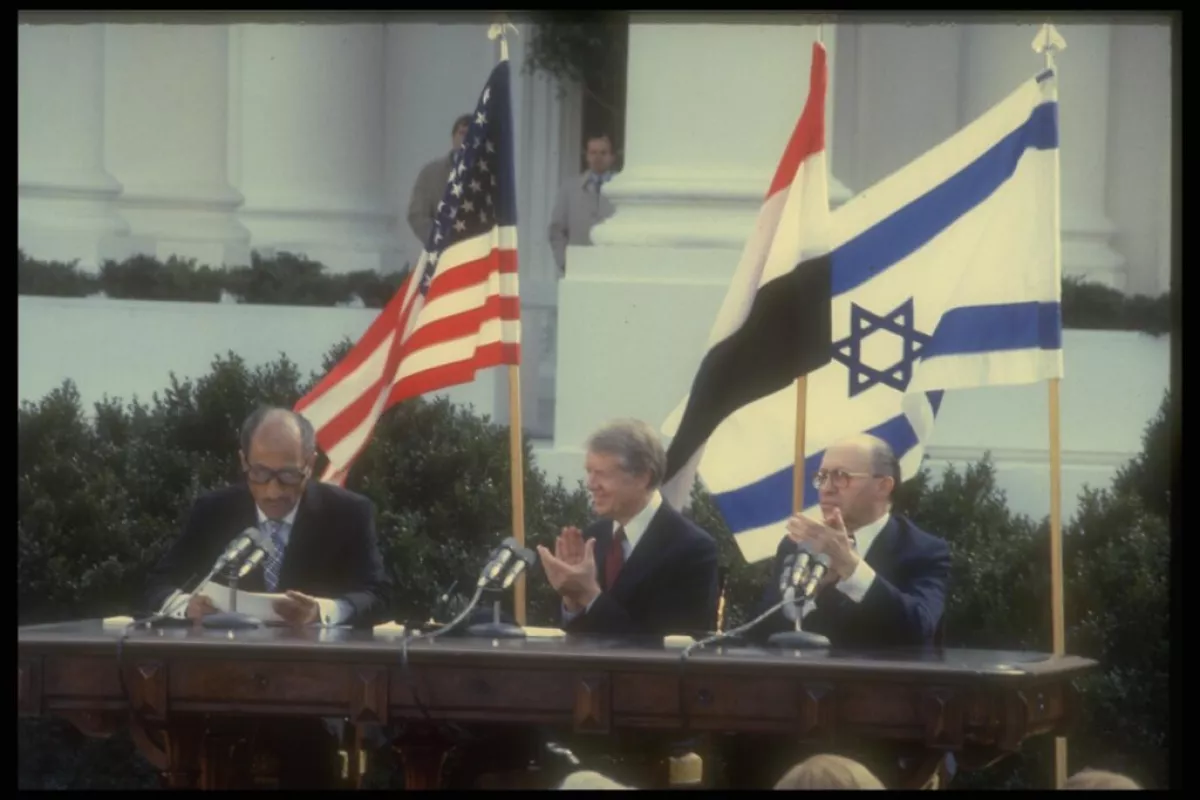Why skeptics are wrong to question Israel-Hamas peace plan's gradual approach Foreign Affairs recalls region’s past milestone agreements
As the world watches the first phase of the cease-fire agreement between Israel and Hamas unfold — signed in Egypt on October 9 — scepticism has already found its way into the minds of many due to the phased nature of the document.
According to the 20-point plan announced by US President Donald Trump, the initial phase now underway includes a partial Israeli withdrawal from Gaza alongside the exchange of detainees. Yet early roadblocks have already emerged, as Israel threatened to suspend the delivery of humanitarian aid after Hamas failed to return the bodies of most deceased hostages.
Still, an article by Foreign Affairs urges caution and trust in the plan as it recalls that a phased approach is far from new in the long history of Middle Eastern crisis diplomacy.
A phased strategy — balancing immediate de-escalation with long-term transitional management — has for decades proven one of the few workable models for ending regional conflicts. Middle East analyst Amr Hamzawy writes in his piece for the publication that for over 75 years, many landmark peace accords, including the 1948 Arab-Israeli armistice and the 1979 Egyptian-Israeli peace treaty, have relied on such an incremental structure.
In both examples, initial agreements were followed by implementation phases that required international sponsorship to mobilise political and technical mechanisms ensuring compliance. Hamzawy argues that historical evidence shows that under the right conditions, phased deals can endure even severe challenges, creating “the incremental trust building and opportunities for negotiation that are necessary for more durable arrangements to take hold.”
According to the author, the real challenge facing Trump’s plan “is not its phased structure but rather whether Washington and its international and regional partners can ensure that the necessary mechanisms, incentives, and penalties are in place” to allow the subsequent steps to succeed.

Lessons from History
The article recalls that phased peace deals have long shaped Middle Eastern diplomacy, beginning with the 1949 armistice agreements between Israel and Egypt, Jordan, Lebanon, and Syria. These were not final settlements but arrangements to halt hostilities and establish Israel’s de facto border, the so-called Green Line. Their purpose was to create breathing room for de-escalation and eventual political dialogue. The accords also featured practical enforcement tools such as field committees, UN monitoring, prisoner exchanges, and humanitarian provisions.
In essence, the 1949 agreements created a temporary yet functional framework for managing conflict — one that could evolve or collapse depending on external guarantees and internal pressures. That structure preserved relative peace between Israel and its neighbours until 1967, apart from the 1956 Suez Crisis. The relative success of those accords owed much to backing from France, the United Kingdom, and the United States, and to UN oversight, including peacekeeping forces along the Egyptian-Israeli border.
After the 1973 Arab-Israeli war, phased diplomacy again took centre stage. US Secretary of State Henry Kissinger’s shuttle diplomacy produced successive disengagement agreements between Israel and Egypt, and later between Israel and Syria. The Israel-Egypt accords paved the way for the 1979 peace treaty, while the Israel-Syria deal of 1974 became a basis for later negotiations, including the Madrid Peace Process of the early 1990s. Today, those same mechanisms underpin renewed talks between Israel and Damascus.
The paper stresses that in every successful case, “the United States did not stop mediating the moment an agreement was signed.” Instead, Washington followed through with negotiation teams, diplomatic leverage, and aid or security packages to keep the process on track. The current peace deal between Israel and Hamas, it argues, should be viewed in this light: US leadership and sustained involvement will be critical to ensure that the first phase leads to meaningful progress in later stages.
The article also highlights another landmark deal: the Camp David Accords, which directly led to the 1979 Egyptian-Israeli peace treaty. These did not aim for instant resolution but created two frameworks — one for bilateral peace and another for Palestinian self-governance in the West Bank and Gaza. “Crucially, the accords were also accompanied by a US commitment to facilitate negotiations, furnish aid to both countries, and ensure the parties’ compliance. The treaty that followed the Camp David talks was, notably, implemented in stages, beginning with gradual withdrawals and territorial exchanges,” the piece highlights.

Yet not all phased agreements have endured, as the paper acknowledges. The 1993 Oslo Accords between Israel and the Palestine Liberation Organization also envisioned a gradual peace through mutual recognition and incremental handovers of control. However, the article recalls, the plan unraveled amid rising extremism and renewed violence. The problem, it argues, was not phasing but implementation: the accords “lacked the kinds of international commitments and effective enforcement tools necessary to ensure their survival.”
A similar fate befell the January 2025 cease-fire between Israel and Hamas, which collapsed due to insufficient US engagement and the absence of regional or international pressure to prevent renewed fighting.
Nevertheless, the article concludes that the United States and its partners present at the Peace Summit in Sharm el-Sheikh must provide both sides with “a broad array of incentives for compliance” while imposing real consequences for violations.
“By adopting a phased agreement, the Trump administration has been able to get both sides to halt a terrible conflict and come to the table," it notes. Having fought a brutal war, the article urges that both sides need to understand that the cost of failure is too high and the benefits of compliance too great for the deal to collapse.
By Nazrin Sadigova








